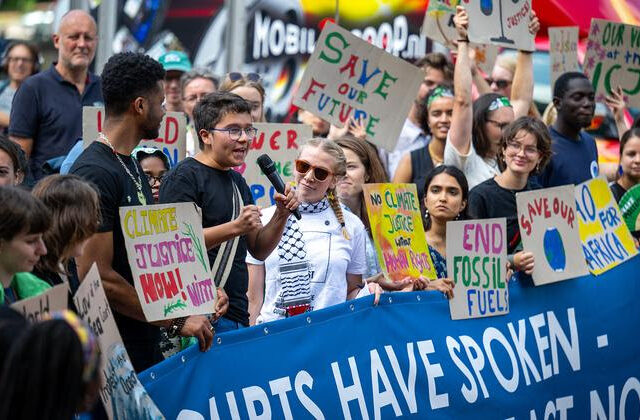By Christopher Burke, Senior Adviser, WMC Africa
Sustainability in fashion refers to practices that foster environmental stewardship, social responsibility and good governance throughout the full lifecycle of a garment from design and production to disposal. The concept examines fashion and textile industry. The global fashion industry is a substantial polluter. The industry is responsible for 10 percent of total annual global carbon emissions and contributes significantly to water pollution. The fashion and textile sector is also an important component of the local economy with deep backward and forward linkages through both the second hand clothing market and the fledging fashion industry. A shift toward sustainable fashion is urgent and essential.
Eleven of the top 20 fastest-growing economies in the world are in Africa according to the African Development Bank. The African Continental Free Trade Area (AfCFTA) established in 2018 is yet to be realized in practice, but is a firm step on the road to full market integration. Africa’s population today stands at 1.3 billion and is projected to reach to 4.3 billion in 2100 representing almost 40 percent of the earth’s population at that time. While many aspects of the global political-economy are uncertain, we are sure to still wear clothes!
Africa represents tremendous diversity comprising 54 countries each made up of many ethnic groups and languages. Fashion designers across the continent are utilizing a vast array of materials, techniques and styles incorporating influences from their own cultures, their neighbors and beyond. The globe is shrinking fast as transportation and communications contribute to a more interconnected world, enabling African fashion designers to reach international markets with greater ease. This has led to a vibrant exchange of ideas, creativity and trends, with African fashion influencing global style while also drawing inspiration from the broader world. The fusion of traditional and modern elements showcases the continent’s rich heritage and forward-thinking innovation, positioning Africa as a key player in the global fashion industry.
The fashion and textile sector is a substantial potential source of pollution. Conventional practices involve excessive water usage, harmful chemicals and massive textile waste. These all contribute to environmental degradation. As the demands for eco-friendly alternatives grow, African fashion is emerging as a leader in the green revolution, blending sustainability with cultural depth and innovation.
Many African designers embrace the use of organic and natural fibers such as cotton, jute and hemp which require fewer resources to cultivate and produce. Additionally, the use of plant-based dyes and hand-woven textiles further reduces their environmental impact. While some designers adopt these practices as part of a genuine commitment to sustainability, others doubtlessly so as a form of green washing.
A growing number of emerging designers across the continent are increasingly aligning themselves with the environmental movement. As a result, Africa’s fledgling fashion industry is becoming known for its eco-friendly materials and indigenous techniques, reflecting a deep respect for nature, cultural heritage and future generations.
The Ethiopian brand Lemlem, founded by supermodel Liya Kebede, is a notable example. Lemlem produces hand woven garments using indigenous techniques passed down through generations. This not only supports local artisans, but minimizes the carbon footprint by relying on handlooms rather than industrial machinery. Fashion and textile industry has deep back and forward deep linkages providing a large number of livelihood and employment opportunities across multiple sectors. Textiles played a key role in the realization of economic miracles across East Asia.
Faith Aweko, founder and CEO at Reform Africa in Uganda uses recycled plastic to produce stylish, but functional high-quality bags. Bobby Kolande the creative director at BUZIGAHILL, also in Uganda, redesigns second-hand clothes for re-export to the global North where they were originally discarded before export to Uganda. Similarly, the Kenyan brand SOKO founded by Joanna Maiden collaborates with local artisans to create jewelry and accessories from recycled materials. By transforming discarded items into wearable art, BUZIGAHILL and SOKO embody the principles of up-cycling and circular fashion.
Sustainable practices in African fashion provide dual benefits: preserving cultural heritage and supporting local economies. Indigenous crafting techniques such as weaving, dyeing and beadwork are integral to the identities of many African communities. By incorporating these methods into modern fashion, designers ensure that these cultural practices remain vibrant and relevant.
Sustainable fashion creates economic opportunities for local artisans and communities. Brands such as Lemlem, Reform Africa, BUZIGAHILL and SOKO all provide fair wages and safe working conditions, empowering individuals and fostering economic resilience. This, in turn, supports the broader community as artisans invest in education, healthcare and other vital services.
African fashion innovations offer significant environmental benefits. The use of natural fibers and dyes reduces chemical pollution while handcrafting techniques lower energy consumption. Indigenous African textiles such as kente from Ghana and Bogolanfini from Mali are produced using eco-friendly dyes and weaving methods. Sustainable fashion encourages consumers to invest in durable, timeless pieces, reducing textile waste and the fast fashion cycle.
More is to be done. Stella Atal, a prominent Ugandan designer based in France, has been working with École Duperré, an art and design college in Paris to research ways to strengthen the durability of bark cloth known as lubugo. The cloth made from the bark of the Mutuba Tree (ficus natalensis) is an indigenous material traditionally worn for ceremonial purposes. Widely considered the oldest non-woven fabric used by man, it is not durable and quickly breaks down when exposed to water. The African Fashion Research Institute (AFRI) in South Africa is heavily engaged in exploring to make more extensive use of bark cloth in fashion.
Sustainable practices in African fashion are not only making waves locally, but influencing global trends. International fashion weeks and exhibitions increasingly feature African designers, highlighting their eco-friendly practices and unique aesthetics.
The Lagos Fashion Week has become a prominent platform showcasing sustainable African fashion, attracting global attention and fostering cross-cultural exchange. Collaborations between African designers and international brands further amplify this influence.
The Ghanaian brand Studio One Eighty Nine, co-founded by actress Rosario Dawson and Abrima Erwiah partners with artisans across Africa to produce sustainable clothing and accessories, blending indigenous techniques with contemporary design. Their collaborations with US based brands such Ebony and J. Crew have made African sustainable fashion more prominent on the global market.
Nigerian designer and founder of Maki Oh, Amaka Osakwe is popularly known for using indigenous African textiles and techniques in her designs. Osakwe is committed to ethical production methods and promoting local artisans. Worn by high-profile figures, including Michelle Obama, Rihanna, Lady Gaga and Beyoncé, Osakwe has promoted the eco-friendly and sustainable nature of African fashion on a global scale.
The future of sustainable fashion in Africa is promising with the potential to lead the global industry’s shift toward eco-friendly practices. As awareness of environmental issues grows, consumers are searching for sustainable alternatives creating a fertile market for African fashion brands.
Predictions for the growth of sustainable fashion in Africa include greater investment in eco-friendly technologies and materials. Erica de Greef, Co-Director at AFRI, suggests the growth of consumer interest in fashion that is sustainable will see a greater appreciation for local fashion brands that uphold traditional techniques. This new generation of afro-sustainable designers from the continent are offering solutions that at both culturally rich and environmentally responsible. African designers are motivated and well positioned to innovate and inspire, offering sustainable solutions that are both culturally rich and environmentally responsible.
The focus on sustainable fashion across the continent can set a powerful example for the rest of the world. By demonstrating the feasibility and benefits of eco-friendly practices, African fashion can encourage global brands to adopt similar approaches and foster a more sustainable future for the entire industry.
African fashion is at the forefront of the green revolution, combining sustainability with cultural heritage and innovation. Utilizing eco-friendly materials, indigenous techniques and empowering local communities, African designers are creating a powerful model for sustainable fashion. As global awareness and demand for sustainability continues to rise, Africa’s influence and leadership in the fashion industry is set to grow, paving the way for a greener more equitable future.
Christopher Burke is a senior advisor at WMC Africa, a communications and advisory agency located in Kampala, Uganda. With nearly 30 years of experience, Christopher has worked extensively on social, political and economic development issues focused on the environment, agriculture, land governance, communications and peace-building in Asia and Africa.








Thanks for sharing excellent informations. Your web-site is so cool. I’m impressed by the details that you¦ve on this blog. It reveals how nicely you perceive this subject. Bookmarked this website page, will come back for extra articles. You, my pal, ROCK! I found just the info I already searched all over the place and just couldn’t come across. What an ideal site.
The next time I read a blog, I hope that it doesnt disappoint me as much as this one. I mean, I know it was my choice to read, but I actually thought youd have something interesting to say. All I hear is a bunch of whining about something that you could fix if you werent too busy looking for attention.
My brother suggested I would possibly like this blog. He used to be entirely right. This post truly made my day. You can not imagine simply how so much time I had spent for this info! Thank you!
Some really nice stuff on this internet site, I love it.
3cef1r